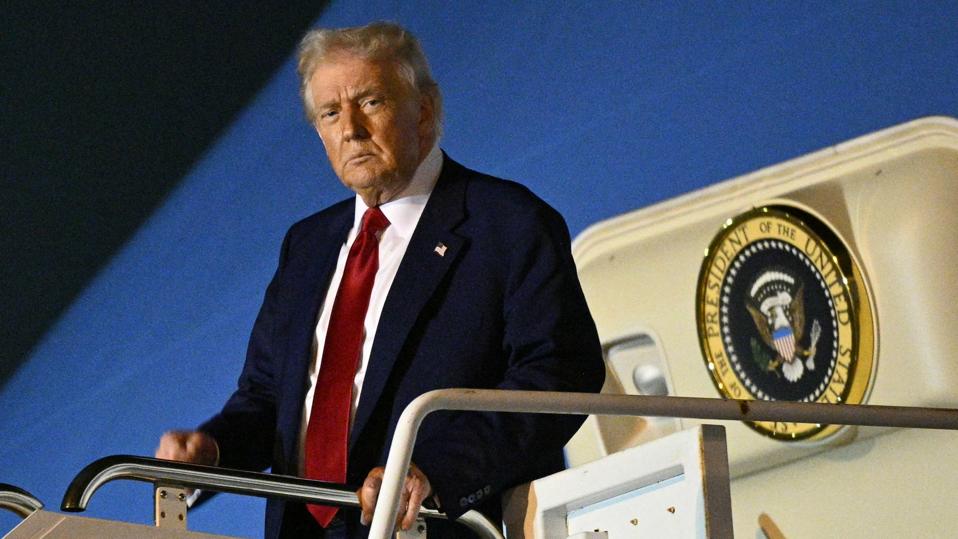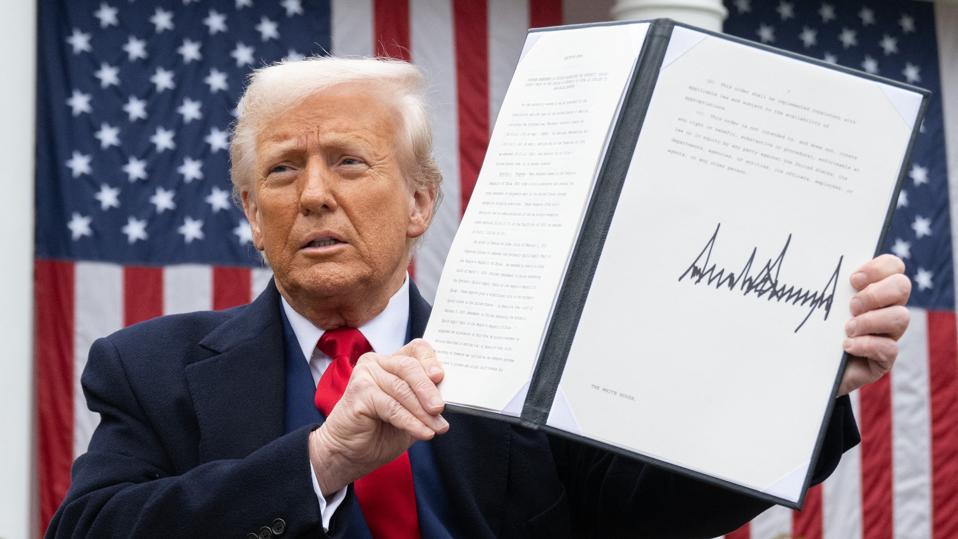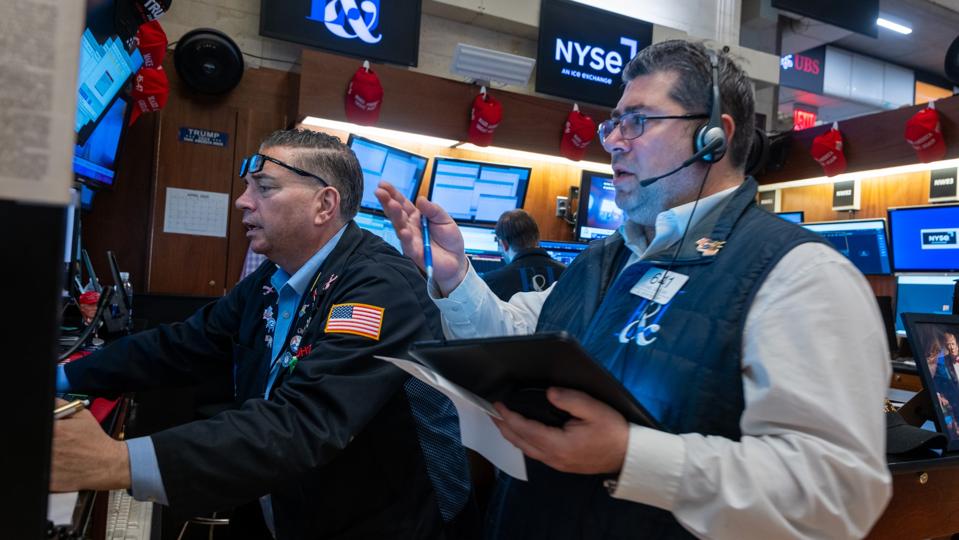Topline
The White House is now negotiating trade deals with dozens of countries after President Donald Trump paused the worst of his sweeping tariffs for 90 days, as foreign countries suggest the pause will give them breathing room as they seek to reach deals with the Trump administration.

President Donald Trump holds up a chart on tariffs while speaking during a trade announcement event in the Rose Garden at the White House on April 2 in Washington, DC.
Getty Images
Key Facts
Trump pared back his sweeping tariffs on foreign imports Wednesday after they roiled the stock market and led to global economic chaos, issuing a 90-day pause on its highest tariff rates.
There will now be a 10% baseline tariff rate on most imported goods, the White House said Wednesday—rather than the higher rates the Trump administration imposed for many countries’ goods—except for China, whose imports will face an additional 125% tariff rate on top of existing tariffs, after the country imposed retaliatory tariffs against the U.S.
More than 75 countries have reached out to the White House to negotiate trade deals, Trump officials have previously said, and economic adviser Kevin Hassett told “Fox and Friends” on Thursday there are now “offers on the table” with 15 countries—though he declined to specify which—and negotiations are “moving fast.”
The Trump administration will prioritize trade deals with countries surrounding China, NBC News reported Thursday citing an anonymous White House source, citing negotiations with Japan, South Korea and Vietnam as “key priorities,” and Japan’s chief trade negotiator will travel to the U.S. this week to begin talks.
White House press secretary Karoline Leavitt said prior to the tariff pause the president directed his trade team to “have tailor-made trade deals with each and every country that” reaches out to the U.S. to negotiate, and Bessent has said the Trump administration will make “bespoke” deals with each nation, though it’s still unclear how long that will take.
While Trump has emphasized any deals that are reached must put “America first,” some countries don’t seem to be giving in so easily: Japanese Prime Minister Shigeru Ishiba said Monday he’s “not of the view that we should make big concessions for the sake of wrapping up negotiations quickly,” while U.K. Prime Minister Kier Starmer said last week he “will only strike a deal if it’s in the national interest.”
Crucial Quote
“Virtually every country wants to negotiate” with the U.S. over tariffs, Trump told reporters before they initially took effect, claiming foreign countries are “offering things to us that we wouldn’t have even thought of asking them for.”
Which Countries Have Offered To Negotiate With Trump On Tariffs?
Japan: Trump asked his administration to start negotiations with the Japanese government even before the 90-day pause. Ishiba previously said he would present a negotiation “package” that could include concessions to the U.S. on liquefied natural gas, cars, agriculture and national security, and the government has also said it is aiming for the Trump administration to entirely remove its tariffs on Japanese goods. While Ishiba said Monday his country wouldn’t rush its negotiations, it’s also moving quickly, with trade negotiator Ryosei Akazawa saying Tuesday the Japanese government will seek to have the tariffs lifted “at the earliest date possible.”
South Korea: Trump said on Truth Social Tuesday morning he had reached “the confines and probability of a great DEAL for both countries” after having a “great call” with Acting President Han Duck-soo. Trade officials from the country said Thursday that while Trump’s 90-day pause provides some breathing room, it’s still important for the country to engage in swift negotiations with the U.S., Reuters reports, adding Tuesday their aim is to delay Trump’s tariffs from taking effect in South Korea for as long as possible.
European Union: The EU has paused its planned retaliatory tariffs after Trump issued his 90-day tariff pause, but announced additional goods Monday that could be taxed if a deal can’t be reached. “We want to give negotiations a chance,” European Commission President Ursula von der Leyen said Thursday, though Bloomberg reported Tuesday talks between the U.S. and EU have so far made little progress, with anonymous sources reporting European negotiators left a recent meeting “with little clarity” on the Trump administration’s goals for a deal.
United Kingdom: British officials have already been in negotiations with the Trump administration and offered concessions in exchange for Trump lowering his 10% tariffs on the U.K., with Prime Minister Keir Starmer’s office saying it will continue to “coolly and calmly” negotiate with the White House in light of Trump’s 90-day pause. Vice President JD Vance told British website UnHerd Tuesday he believes “there’s a good chance that, yes, we’ll come to a great agreement that’s in the best interest of both countries.”
Vietnam: The U.S. and Vietnam have agreed to begin trade negotiations, the country’s government said Thursday, after Vietnam’s Communist Party sent a letter to the White House offering to remove all tariffs on U.S. goods in hopes of lowering the 46% tax Trump imposed for Vietnamese imports. Chinese President Xi Jinping visited Vietnam on Monday and called for stronger ties between the neighboring nations, however—a visit that had been planned before Trump’s tariffs took effect, though Trump said he thought China intentionally wanted the talks to “screw” the U.S.
Taiwan: The Taiwanese government said Monday it is now negotiating with the Trump administration and the talks are going “smoothly.” Taiwan previously vowed to increase its investments in the U.S. rather than retaliating against the 32% tariffs Trump initially levied on the country, with foreign minister Lin Chia-lung saying Thursday the government hopes Trump’s 90-day pause will give some breathing room as Taiwan tries “to take advantage of the huge U.S. market” and “form a Taiwan-U.S. coalition.”
India: Commerce Secretary Sunil Barthwal told reporters Tuesday that India has already made “very good progress” in its trade discussions with the U.S. and is pursuing a “path of trade liberalization,” adding India “hopes to negotiate a good bilateral trade agreement with the US.”
Argentina: Argentine President Javier Milei is a Trump ally who received an award for his libertarian agenda at Mar-a-Lago after the tariffs were announced, the Associated Press reports, though his government is negotiating the 10% tariffs Trump imposed on Argentine goods. Bessent met with Milei on Monday and praised the leader for trying to reduce trade barriers with the U.S., though he did not commit to the U.S. lowering Argentina’s tariffs, telling Bloomberg the country should bring its “A-game” to negotiations.
Israel: Prime Minister Benjamin Netanyahu visited Trump at the White House on Monday, telling reporters Israel will eliminate its trade deficit with the U.S. “very quickly” and he wants his country to serve as a “model” for how to negotiate with the U.S. on trade. Trump had not announced any commitment to ease the 17% tariffs he levied on Israeli imports prior to Wednesday’s pause, however, though White House economic adviser Peter Navarro said Sunday the Trump administration is in active negotiations with the country.
Bangladesh: The Bangladeshi government asked the Trump administration on Monday to pause its 37% tariffs on the country’s goods for three months, Bloomberg reports, as the country pledged to “substantially increase” its imports of American products.
Cambodia: Cambodia’s commerce ministry sent a letter to the Trump administration pledging to cut tariffs on its U.S. imports from 35% to 5% after Trump levied 49% tariffs on the nation, and the ministry said Thursday it received a “positive response” from the White House and will soon send a delegation to the U.S. to negotiate.
Indonesia: Indonesia’s finance minister told Reuters Thursday Trump’s 90-day pause will give the country time to negotiate with the White House and come up with a “win-win” agreement for both countries, as the 32% tariff rate the president had initially imposed on Indonesia threatened to reduce their GDP by up to 0.5%.
Lesotho: Trump levied crippling 50% tariffs on the tiny landlocked African country, whose textile industry provides denim to top American brands like Levi’s—and Lesotho’s government has been planning to send a delegation to Washington to negotiate, The Washington Post reports.
Australia: Australian Prime Minister Anthony Albanese decried Trump’s 10% tariffs on the country as being unfair—given that Australia does not levy any tariffs on U.S. goods—but has said the government would not impose any retaliatory tariffs in response, and the Australian government said Thursday it had turned down an offer from China to “join hands” and fight Trump’s tariffs, preferring instead to “[diversify] our trade around the world.”
New Zealand: The country’s government has previously said it will not retaliate against Trump’s 10% tariffs on its exports, with Finance Minister Nicola Willis saying New Zealand “has enough resilience to withstand” the levy. Prime Minister Christopher Luxon said Thursday he was glad to see the pause on Trump’s tariffs, but “it doesn’t change the fundamental premise that we want to advocate very strongly on the world stage for free trade.”
Will The Trump Administration Get Rid Of Its 10% Tariffs?
It’s still unclear if Trump administration’s baseline 10% tariff rate on most foreign goods could be lifted, or if it’s is here to stay even as countries negotiate down the higher rates that were put on pause. Trump previously told reporters he thinks the 10% rate is “the floor,” though there could be limited exceptions, though Bessent wouldn’t commit Monday to saying either way whether any country’s tariff rates could go down to zero. “We’ll see. I don’t know what’s going to happen with the negotiations,” Bessent told Bloomberg TV, noting there’s “a whole box of things we’ve got to overcome: tariffs, non-tariff barriers, trade barriers, currency manipulation and subsidization of labor and facilities.”
How Long Will The Negotiations Take?
Bessent has not given any specific indication of how long negotiations could take, or if there could be any further extension beyond the 90-day pause if the talks aren’t over by then. JPMorgan Chase chief Jamie Dimon speculated in an interview with Fox Business Wednesday, prior to Trump’s pause, that trade deals will not be completed quickly, noting “trade deals are very large and very complex” and “can’t be done overnight.” Hassett suggested on “Fox and Friends” Thursday that the trade negotiations may go quicker than normal trade deals, however, saying he’s joked that during the 90-day pause, “We’re going to go around the world in 80 days and then have 10 days of rest.” “That’s the plan,” Hassett added.
Surprising Fact
Trump levied tariffs on several uninhabited islands or places with only a few residents, such as the Heard and McDonald Islands, an Australian territory that’s primarily inhabited by penguins. It will likely be more difficult for those nations to reach any negotiations about lowering their tariffs down from the 10% blanket rate. Commerce Secretary Howard Lutnick defended the tariffs on those countries Sunday, claiming to CBS News they were necessary or else other countries could try to use them to get around Trump’s tariffs.
What Did The Trump Administration Say About Negotiating On Tariffs?
Trump’s pause on tariffs comes after his aides had previously claimed the president was not open to making deals, let alone pausing tariffs entirely. “He’s not going to back off,” Lutnick told CNN on Thursday after Trump’s tariffs were announced, then telling CBS News Sunday, “There’s no postponing [the tariffs taking effect], they’re definitely going to stay in place for days or weeks.” Trump trade adviser Peter Navarro has similarly suggested the tariffs are not up for discussion, writing in an op-ed Monday for the Financial Times, “This is not a negotiation,” even as Trump himself suggested he was willing to make deals hours later. In an interview with Fox News on Sunday, Navarro decried what he called “non-tariff cheating” by other countries, suggesting countries would have to make concessions beyond lowering tariffs on U.S. goods in order to get the White House to lower tariffs on their products. “We’re always willing to listen .. if you want to come and talk to us,” Navarro said about other countries negotiating with the U.S.
Key Background
Trump imposed sweeping tariffs on other countries Wednesday, fulfilling a longtime campaign promise to levy tariffs on foreign goods in an effort to return manufacturing to the U.S. The president’s plan has long been decried by economists, who have warned any tariffs would raise prices for consumers and harm the U.S. economy—a scenario that started playing out after Trump announced his tariffs, as stocks plunged and economists forecasted a recession could now be on the way. Trump had continued to double down on his economic plan despite the chaos his tariffs have caused prior to issuing his pause, saying Wednesday morning on Truth Social, “BE COOL! Everything is going to work out well.” The president told reporters Monday that while other presidents would not be willing to cause such economic chaos by imposing them, “I don’t mind going through it, because I see a beautiful picture at the end.”


